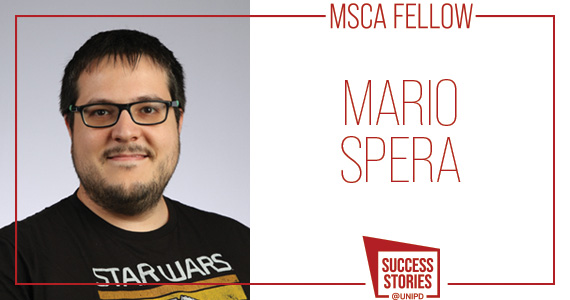
MSCA Fellow: Mario Spera
Raise your eyes to the night sky… How many stars can you count?

Mario Spera is an astronomer who is working at the forefront of computing methods. While he was spending his post doc at the University of Innsbruck he was awarded a Marie Skłodowska-Curie (MSCA) Global Fellowship, which he started on October 2018.
Studying the motion and evolution of stars is one of the most challenging tasks, even for the latest computing technologies and software. At present, without using any approximations, we can simulate the evolution of an ensemble of ''only'' a few hundred thousand stars, corresponding to not even the 0.0001% of the stars in our own Galaxy.
With his MSCA project, Mario aims at improving this aspect by developing a new software that can take maximum advantage from the latest computing technologies.
Can you tell us about your research path so far and why did you choose to apply for a MSCA-IF?
I did my Master Thesis in Astronomy and Astrophysics at La Sapienza University, in Rome, where I also obtained my PhD in Astronomy, in 2014. At the end of my PhD, I felt the need to extend my research network and to acquire new perspectives and competences. For these reasons, I decided to move to the Astronomical Observatory of Padova for a postdoc. I started to think about the possibility of a Marie Skłodowska Curie Fellowship in early 2017 for the first time. I decided to apply because a MSCA Global Fellowship would result in a period of stay of 2 years outside the European Union, which would allow me to gain new scientific (and personal) insights. Moreover, such a project would put me at the forefront of my research topics. While I was waiting for the call results, I kept myself on the go: I first worked at Bicocca University, in Milan, and then at the University of Innsbruck, in Austria. Finally, in February 2018, just after a few months in Innsbruck, I was awarded the Fellowship, which, just to give myself the chance to spend at least a full year in Innsbruck, I decided to start in October 2018.
You won a Marie Skłodowska Curie Global Fellowship and now you’re spending a visiting period in the US at the Northwestern University. How did you choose your host institution?
I have been a member of the LIGO-Virgo international collaboration since 2018; that is a group of more than 1000 scientists dedicated to the search of gravitational waves. One of the main objectives of my MSCA project (entitled HOMERICS) is to provide an astrophysical interpretation for the gravitational-wave sources detected by LIGO-Virgo. To do that, it is crucial to study how stars move (dynamics) and how they evolve and interact with each other (stellar evolution). With this in mind, I chose two hosts with the strongest overlap and expertise with respect to the topics of my project: Northwestern University, with its strong LIGO group and internationally recognized experts of stellar dynamics, and the University of Padova, at the forefront of the stellar evolution research field.
You work with frontier computing technologies and methods. Was this an important aspect of your project proposal?
This is definitely one of the most crucial aspects in my project. In the HOMERICS project, I study how stars interact with each other, in different astrophysical environments, and the final goal is to provide astrophysical interpretations for LIGO-Virgo gravitational-wave sources. Studying the motion and evolution of stars is one of the most challenging tasks, even for the latest computing technologies and software. At present, without using any approximations, we can simulate the evolution of an ensemble of “only” a few hundred thousand stars, corresponding to not even the 0.0001% of the stars in our own Galaxy. In contrast, the LIGO-Virgo interferometers can already detect gravitational-wave signals coming from a volume containing millions of different galaxies! Therefore, we are still very far from catching the whole story of how stars move and evolve. One of the objectives of my MSCA project is to improve this aspect by developing a new software that can take maximum advantage from the latest computing technologies.
Astrophysics is a research field with huge international collaborations. Does it make it easier or harder to win a MSCA-IF?
When I applied for the Marie Skłodowska Curie Fellowship, I was not part of a huge international network. As such, at that time, my CV was ''weaker'' in terms of metrics (publications and citations) compared to that of people who were members of huge collaborations. Nevertheless, this did not prevent me to get the MSCA Fellowship, therefore being a part of a large collaboration might help but that is not the whole thing. A good project, the well-motivated choice of host institutions, and showing that your research will have a deep impact on both your career and on the scientific community are much more important aspects. So, a tip for future applicants: the only way not to get the Marie Skłodowska Curie Fellowship is by not applying for it ... my recommendation is to be positive and not shy!
How will your MSCA Global Fellowship help your career?
It has already helped my career crucially! Being in the US for 2 years for the Marie Skłodowska Curie outgoing phase (which will end next October), helped me to significantly extend my research network. Moreover, it allowed me to acquire new competences, to bring me at the forefront of my research field, and to lay the foundations for new scientific collaborations, which will last well beyond the end of the Marie Skłodowska Curie Fellowship. All these aspects have already been crucial for my career since I was recently offered a type-B research position (Italian ''RTDB'', leading to a tenure track professorship position), which can be offered to researchers who have been awarded a MSCA Global Fellowship at an Italian Research Institution. Such chance of stability was a huge achievement, not only for my future career, but also for my whole life!
International Research Office
via Martiri della libertà 8, 35137 Padova, Italy
tel. +39 049.827 1947 / 1948 / 1945
fax +39 049.827 1911
international.research@unipd.it


